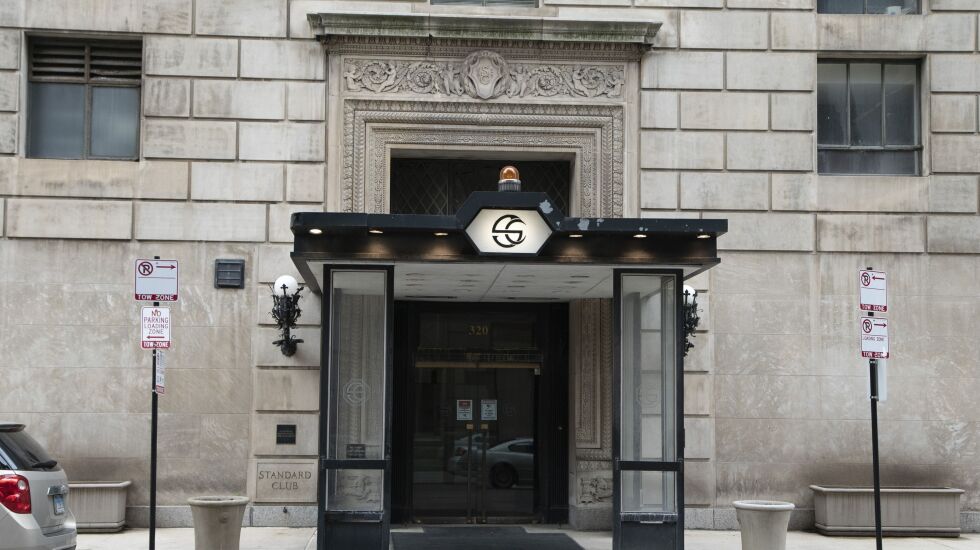
For 150 years, the Standard Club was a mecca for Chicago’s business titans, many of them Jews who were banned by the discriminatory membership policies of the University Club and Union League Club.
Now, the shuttered club near the Dirksen Federal Building is being used to house 761 asylum-seekers and as many as 1,200 in the coming months.
“As the city continues to respond to this humanitarian crisis, the Social Club is one of the sites being used as a temporary shelter to support new arrivals. It has been a temporary shelter since March 1,” a city statement said in response to questions from the Chicago Sun-Times.
Retiring Ald. Sophia King (4th), whose ward includes the club, said she “did not pre-approve any of the locations” in her ward.
But there were “several meetings and concerns with residents after migrants arrived” and the decision to use the shuttered Standard Club “shouldn’t be a surprise anymore,” King wrote in a text message.
“This is an issue that needs a collaborative approach. ... Accountability has to be spread across the country, state and city and with the migrants as well as the countries they are fleeing from,” King wrote.
“We can’t all say, ‘Not in our backyards.’ But by the same token, we should be better prepared for this human crisis.”
Mayor-elect Brandon Johnson echoed that sentiment, in a statement that followed this week’s furious opposition to the city’s plan to use shuttered South Shore High School as a respite center.
Johnson promised to work with residents and their local alderperson to “make sure every community, and every person in it, is protected.”
“Many communities have for too long been denied basic amenities and resources that could help strengthen them, but the stronger our communities are, the better position we are in to support both newcomers and current residents and families,” the mayor-elect said.
The Standard Club is on Plymouth Court in the shadows of the federal building complex.
Chief U.S. District Judge Rebecca Pallmeyer alerted her colleagues to the designation in a recent email.
“Some of you have observed increased activity at the building formerly occupied by the Standard Club, 320 South Plymouth Court. We have learned that the City of Chicago is using the building as temporary housing for newly-arrived migrants. There are 700 new residents, and the number is expected to rise to 1200, at least for several months,” Pallmeyer wrote.
“Some of these new neighbors are likely to be frightened and anxious. Please exercise caution and courtesy whenever you are in the areas surrounding the Courthouse.”
The Federal Protective Service and the U.S. Marshal Service “are monitoring the situation and will continue to advise me of any noted changes,” the chief judge wrote.
At a joint City Council committee hearing last week, alderpersons were told Chicago is out of money, space and time to handle the humanitarian crisis caused by asylum-seekers descending on the city with 40,000 people waiting at the border and a surge that has yet to peak.
The calamity is so dire — with young families sleeping on the floors of police stations and “walk-ins” rising from 10 to 125 a day — the city is now being forced to make “hard decisions” that include taking Brands Park Field house and Leone Beach House offline and using shuttered South Shore High School to serve as emergency shelters for asylum-seekers.
With “zero dollars” from the federal government for 2023 costs and a $53 million shortfall to meet the surge through June, the Budget Committee will meet Tuesday to consider a “mid-year budget amendment” that uses 2021 surplus funds to plug the gap.
The Standard Club’s 150-year history dates back to the days when Chicago’s most exclusive private clubs prohibited Jews and women from joining.
The discriminatory policies gave birth to the Standard Club, which included a similar offering of restaurants, athletic facilities, meeting and banquet space and rooms for overnight stays.
All of the private downtown clubs were forced to adapt to aging demographics and changing styles for dining and entertainment when three-martini lunches and generous expense accounts were eliminated.
When revised menus, redesigned facilities and programs and reduced membership dues for younger members didn’t work, the Chicago Athletic Club, 12 S. Michigan Ave., closed and was converted into a hotel.
In 2019, the Standard Club asked its members for extra money to keep it going. It wasn’t enough.
The storied club closed for good in March 2020 and was sold for $9 million to hotel investor Remo Polselli, who served time in federal prison for income tax evasion.







